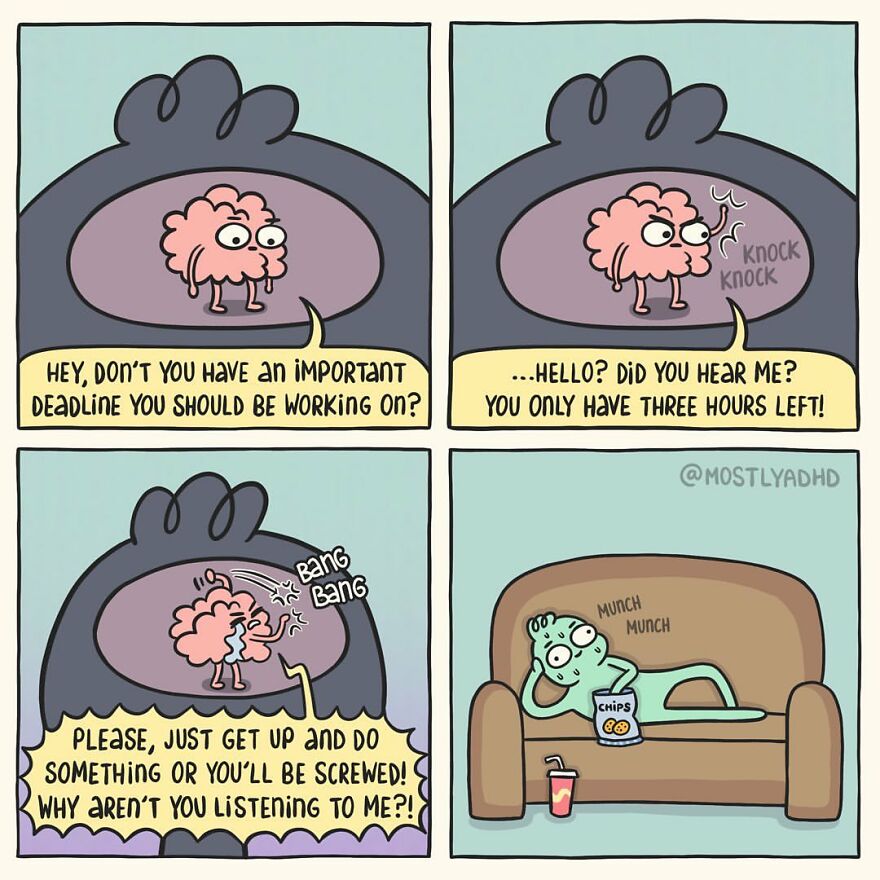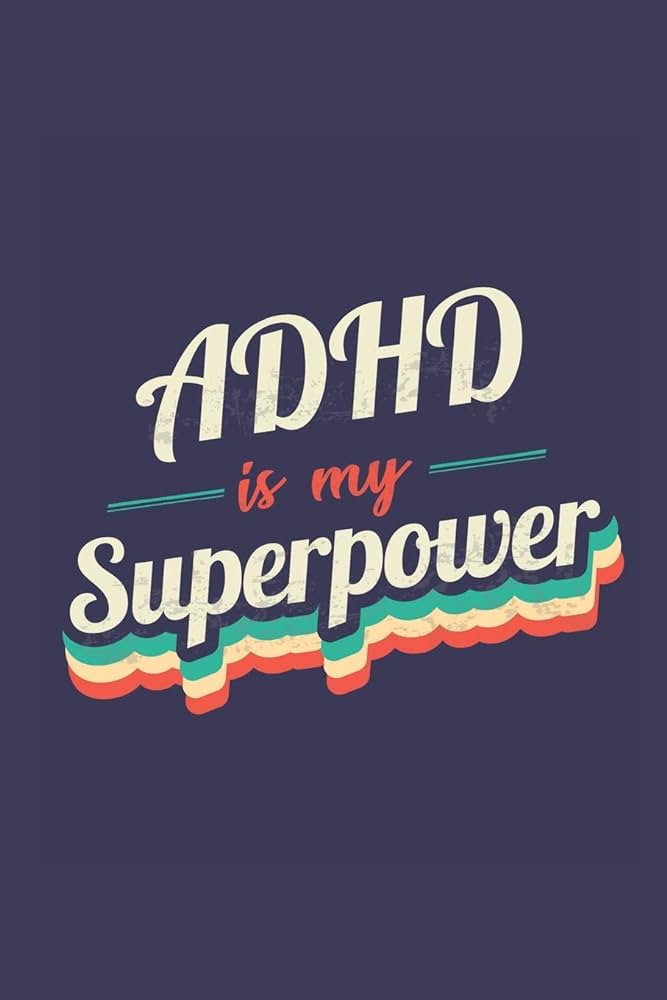I can’t believe that I made it to my forties before realising that I have ADHD. Of course, I’d had some inklings that maybe my brain works a bit differently, but how often do you really compare how you process things with your friends or colleagues? Also, for the longest time, I didn’t know any neurodiverse people (or, more likely, we didn’t talk about it). So I didn’t really know what it’s like to have ADHD; otherwise, I might have recognised some very familiar characteristics. And, I’d always loved and done well in school, so there’d been no reason to suspect anything.
In the past couple of years, I’ve taken to reading up on ADHD with gusto to really try to understand my brain. And I’ve noticed 4 pieces of advice that people (helpfully, I’m sure) offer me that tell me that other people don’t know what it’s like to have ADHD either. Of course, everyone is different, and no one is “just ADHD”; we all have many other characteristics and preferences that come into play. Also, it isn’t a switch: you don’t either have ADHD or don’t have it. Everyone is on a continuum and displays different amounts of ADHD characteristics. Therefore, this is my personal experience, and I’ve tried to write it so that you’d get some idea of what it’s like to have ADHD.

So, what tips might be less than helpful for someone with ADHD?
1. You should meditate
I get this particular piece of advice a lot. I’m guessing that I look calm and peaceful on the outside; last week, someone I’d just met called me “grounded”. (Me? Grounded??) I’m not sure how come I’ve ended up with this look (maybe because I’m too lazy to fidget?) but on the inside, I am restless pretty much all of the time. My thoughts run from one unrelated thing to another and yet another so fast that it’s sometimes a wonder I can put any coherent speeches together. It’s not usually a problem, more like a feature; it’s just the way I think. But if I’m too stressed out, had too little sleep, or am otherwise functioning suboptimally, the thoughts start spinning around uncontrollably. Usually, they move in a cycle where a few different thoughts follow each other, round and round.
If I then tell someone that I’m finding it hard to relax, they usually advise me to meditate. And I get why they say that and how it would be useful. But it’s totally impossible; I almost get a panic attack just thinking about it. I’ve tried these really short meditation exercises for 3 minutes. What tends to happen is that I try to really calm down and let my thoughts wander without judgment, but I get increasingly antsy with this pressure building up in my brain.
Then, after what feels like at least 15 minutes, I give up. I’m always totally surprised to find out that there is almost 2 minutes left of the exercise. In other words, I lasted for just over 1 minute. And something like that makes me feel frustrated, angry, and like a total failure because I can’t even manage 3 minutes of being still. Obviously, not a great feeling, and therefore I usually steer clear of mediating. And just smile and agree when someone suggests I should try it.
2. Everyone has trouble concentrating
I have tried to explain to other people that when you have ADHD, it’s very difficult to concentrate on things that aren’t interesting. The usual response is that everyone has trouble concentrating. And of course, people with ADHD don’t have exclusive rights to having trouble concentrating. What’s different is the degree to which it happens. So I don’t have problems concentrating per se; if I’m intrinsically motivated to do something, I can spend hours on it, no problem. But if the motivation is not there, I’ll go to every possible length to avoid doing it.
Let’s take an example. I was recently assigned to review two conference papers and give feedback on them. Now, I’m an academic researcher, so this is a reasonable task. This task came with a strict deadline of one particular Thursday at 11 p.m. I was not motivated to do this task; understood that I had to do it, yes; motivated, no. Obviously, I left it to the last day, as any good procrastinator will do. I estimated that it’d take me about 4 hours to review the papers. The clock approached 6 p.m. (which is when I usually stop working here in Portugal) and I’d still done nothing. I ate some dinner and socialised a bit with the family. I went back to my laptop around 8 p.m., knowing that it was already too late to do the reviews properly.
Did I start on the reviews then? Noooo. I did tell myself, very strictly, that now is absolutely the last moment to start the task. Then I watched helplessly from above as someone who looked a lot like me opened yet another browser tab. (I usually have about 30 of them open to maximise the chances of getting sidetracked from what I was supposed to do.) And this person started to look at dinner recipes! “You crazy woman, stop that! That is in no way urgent. Guess what is urgent? The reviews!” I yelled at myself, but to no avail.
About an hour later, the crazy woman reluctantly turned to the reviews. She worked in a disciplined and determined manner until 10.59 p.m. when she submitted the reviews; probably not as well done as she’d have liked them to be, but done nevertheless. Then she went to bed and tossed and turned for 2 hours because she’d worked too late. She woke up cranky and tired the next morning and picked fights with her family over small things. She felt guilty about all of it. And she did it all over again with the next task she did not feel like doing.
The End.

3. Let’s do things the way they’ve always been done
This is probably the worst thing anyone can require of me. I thrive in ambiguity, a fast pace, and when there’s a lot of change. I dislike routine and doing things by the book. By all means, let’s rock the boat, open that can of worms, and take the bull by the horns! But when someone (at work, usually) asks me to just repeat what’s been done before, it feels like taking a bullet to the soul. I get, of course, that it’s a lot quicker and easier to do it like that. But I’m not about quick and easy; I want to go for interesting and different. My strengths lie in being able to see alternative ways of doing things, having the guts to go through with it, and learning from my mistakes. And if I can’t do that, I find it very difficult to muster up enough motivation to get the task done (see previous point for what happens then).
4. You should read the instructions
Well, I’m sure it’s a very good idea, and I can see how that’d help with getting many things done right from the start. However, reading instructions is boring and keeps you away from the actual doing. Therefore, I usually don’t have the patience for it. I acknowledge that there are some consequences to this. It’s probably largely why hubby will not assemble IKEA furniture with me, although I happen to think it’d be a great relationship builder. It’s also the reason we played a board game 4 times before I got the rules right. (Why hubby would put me in charge of figuring out how to play a new board game is beyond me. So if he lost 4 times because the rules kept changing, whose fault is that?) It’s probably also why I have a rather large bottle of something that should be used as a “vitamin serum” in my toiletry bag instead of the night cream I was going to buy.
In the end, I love my ADHD brain and wouldn’t give it up for the world. What about you? Does any of this ring a bell? Did it help you to understand what it’s like to have ADHD or confuse you even more? I’d love to hear from you, so please, leave a comment!

